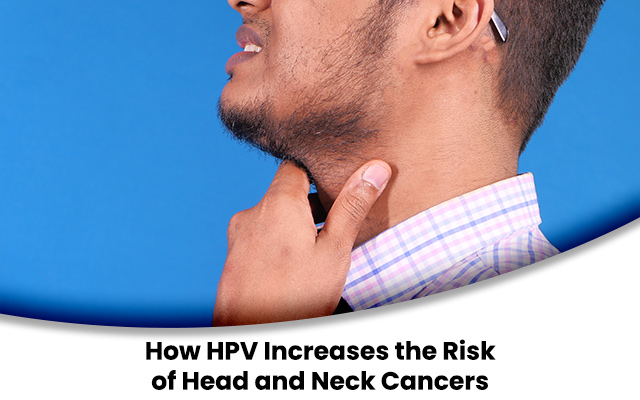Human papillomavirus (HPV) is one of the most common sexually transmitted infections. Though it is commonly associated with cervical cancer, its role in the development of head and neck cancer has become a topic of concern. HPV, in particular, is linked to oropharyngeal squamous cell carcinoma, which affects a part of the throat present behind the mouth. Know more about how HPV increases head and neck cancer risk.
How Does HPV Cause Head and Neck Cancer?
The connection between HPV and head and neck cancers, mainly in the throat, has become quite noticeable in recent years. Cancers affecting the base of the tongue and tonsils are currently on the rise, mostly due to HPV infections. As per research, HPV-related cases of cancer are becoming more common, particularly in individuals who have no risk factors such as drinking alcohol and smoking.
HPV usually spreads through oral sex. Though HPV infections usually go away on their own. In some cases, they may remain in the body for a long time and cause changes in cells, eventually increasing cancer risk.
Symptoms of HPV-related Head and Neck Cancer
It may be hard to detect the early symptoms of head and neck cancer. This is because HPV-related head and neck cancers may not show symptoms right away. Some of the common signs of HPV-related head and neck cancer in the mouth or throat include:
- A sore throat that does not go away
- Lump or pain in the neck
- Trouble swallowing
- Unexplained weight loss
- Ear pain
If you are experiencing any of these symptoms, you can schedule a consultation with Dr Suvadip Chakrabarti, a cancer surgeon from Kolkata.
Tips to Prevent HPV-related Head and Neck Cancer
You can prevent the risk of developing HPV-related head and neck cancer in the following ways.
- Get HPV Vaccine: The HPV vaccine can help safeguard against certain types of HPV that can increase cancer risk, such as HPV 16 and 18. It is recommended for young boys and girls before they become sexually active. But, it can be suitable for older teenagers and adults too.
- Practice Safe Sex: To prevent HPV-related head and neck cancer, you must practice safe sex. Use condoms while engaging in any sexual activity and limit the number of sexual partners. This can help lower your cancer risk.
Conclusion
Certain high-risk strains of HPV can increase your chances of developing head and neck cancer. If you experience the symptoms mentioned above, don’t delay in seeking medical attention and consult Dr Suvadip Chakrabarti, a robotic cancer surgeon in Kolkata, for clarity.


